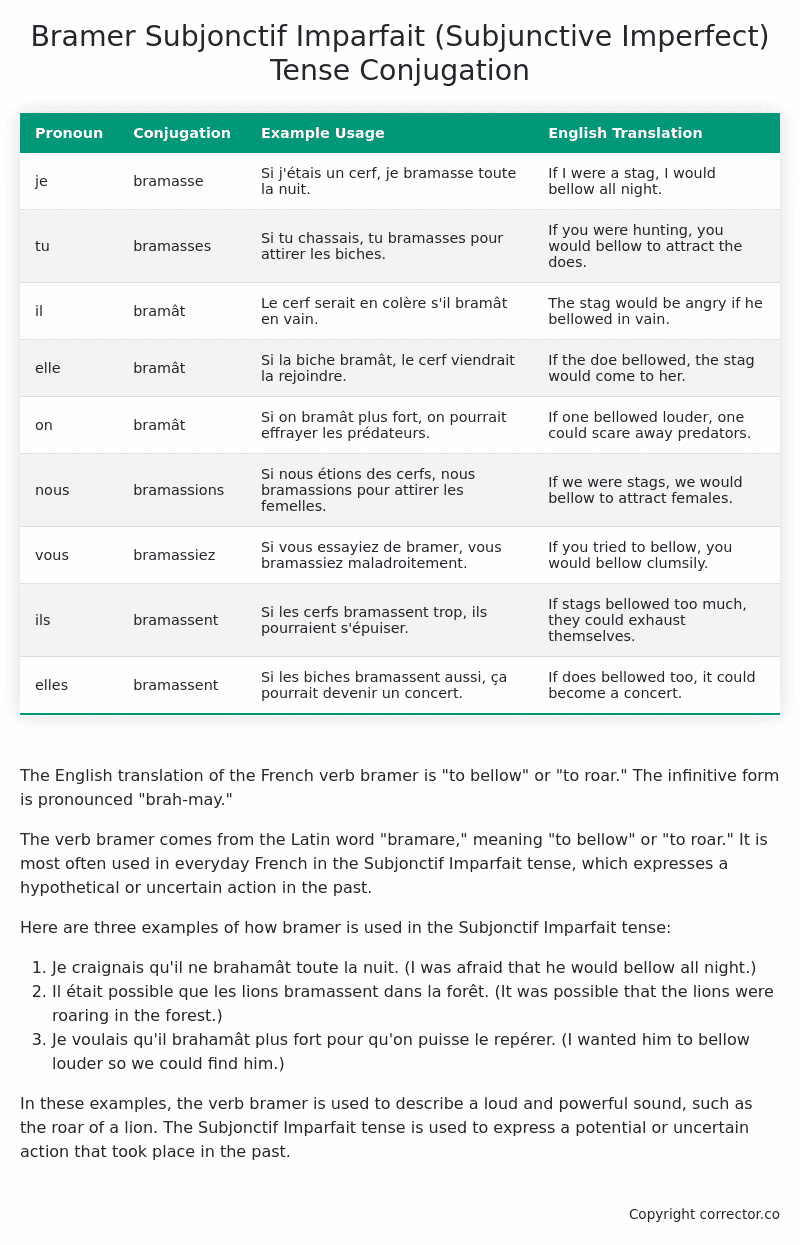Subjonctif Imparfait (Subjunctive Imperfect) Tense Conjugation of the French Verb bramer
Introduction to the verb bramer
The English translation of the French verb bramer is “to bellow” or “to roar.” The infinitive form is pronounced “brah-may.”
The verb bramer comes from the Latin word “bramare,” meaning “to bellow” or “to roar.” It is most often used in everyday French in the Subjonctif Imparfait tense, which expresses a hypothetical or uncertain action in the past.
Here are three examples of how bramer is used in the Subjonctif Imparfait tense:
- Je craignais qu’il ne brahamât toute la nuit. (I was afraid that he would bellow all night.)
- Il était possible que les lions bramassent dans la forêt. (It was possible that the lions were roaring in the forest.)
- Je voulais qu’il brahamât plus fort pour qu’on puisse le repérer. (I wanted him to bellow louder so we could find him.)
In these examples, the verb bramer is used to describe a loud and powerful sound, such as the roar of a lion. The Subjonctif Imparfait tense is used to express a potential or uncertain action that took place in the past.
Table of the Subjonctif Imparfait (Subjunctive Imperfect) Tense Conjugation of bramer
| Pronoun | Conjugation | Example Usage | English Translation |
|---|---|---|---|
| je | bramasse | Si j’étais un cerf, je bramasse toute la nuit. | If I were a stag, I would bellow all night. |
| tu | bramasses | Si tu chassais, tu bramasses pour attirer les biches. | If you were hunting, you would bellow to attract the does. |
| il | bramât | Le cerf serait en colère s’il bramât en vain. | The stag would be angry if he bellowed in vain. |
| elle | bramât | Si la biche bramât, le cerf viendrait la rejoindre. | If the doe bellowed, the stag would come to her. |
| on | bramât | Si on bramât plus fort, on pourrait effrayer les prédateurs. | If one bellowed louder, one could scare away predators. |
| nous | bramassions | Si nous étions des cerfs, nous bramassions pour attirer les femelles. | If we were stags, we would bellow to attract females. |
| vous | bramassiez | Si vous essayiez de bramer, vous bramassiez maladroitement. | If you tried to bellow, you would bellow clumsily. |
| ils | bramassent | Si les cerfs bramassent trop, ils pourraient s’épuiser. | If stags bellowed too much, they could exhaust themselves. |
| elles | bramassent | Si les biches bramassent aussi, ça pourrait devenir un concert. | If does bellowed too, it could become a concert. |
Other Conjugations for Bramer.
Le Present (Present Tense) Conjugation of the French Verb bramer
Imparfait (Imperfect) Tense Conjugation of the French Verb bramer
Passé Simple (Simple Past) Tense Conjugation of the French Verb bramer
Passé Composé (Present Perfect) Tense Conjugation of the French Verb bramer
Futur Simple (Simple Future) Tense Conjugation of the French Verb bramer
Futur Proche (Near Future) Tense Conjugation of the French Verb bramer
Plus-que-parfait (Pluperfect) Tense Conjugation of the French Verb bramer
Passé Antérieur (Past Anterior) Tense Conjugation of the French Verb bramer
Futur Antérieur (Future Anterior) Tense Conjugation of the French Verb bramer
Subjonctif Présent (Subjunctive Present) Tense Conjugation of the French Verb bramer
Subjonctif Passé (Subjunctive Past) Tense Conjugation of the French Verb bramer
Subjonctif Imparfait (Subjunctive Imperfect) Tense Conjugation of the French Verb bramer (this article)
Subjonctif Plus-que-parfait (Subjunctive Pluperfect) Tense Conjugation of the French Verb bramer
Conditionnel Présent (Conditional Present) Tense Conjugation of the French Verb bramer
Conditionnel Passé (Conditional Past) Tense Conjugation of the French Verb bramer
L’impératif Présent (Imperative Present) Tense Conjugation of the French Verb bramer
L’infinitif Présent (Infinitive Present) Tense Conjugation of the French Verb bramer
Struggling with French verbs or the language in general? Why not use our free French Grammar Checker – no registration required!
Get a FREE Download Study Sheet of this Conjugation 🔥
Simply right click the image below, click “save image” and get your free reference for the bramer Subjonctif Imparfait tense conjugation!

Bramer – About the French Subjonctif Imparfait (Subjunctive Imperfect) Tense
Formation
Common Everyday Usage Patterns
Interactions with Other Tenses
Subjonctif Présent
Indicatif Passé Composé
Conditional
Conditional Perfect
Summary
I hope you enjoyed this article on the verb bramer. Still in a learning mood? Check out another TOTALLY random French verb conjugation!


